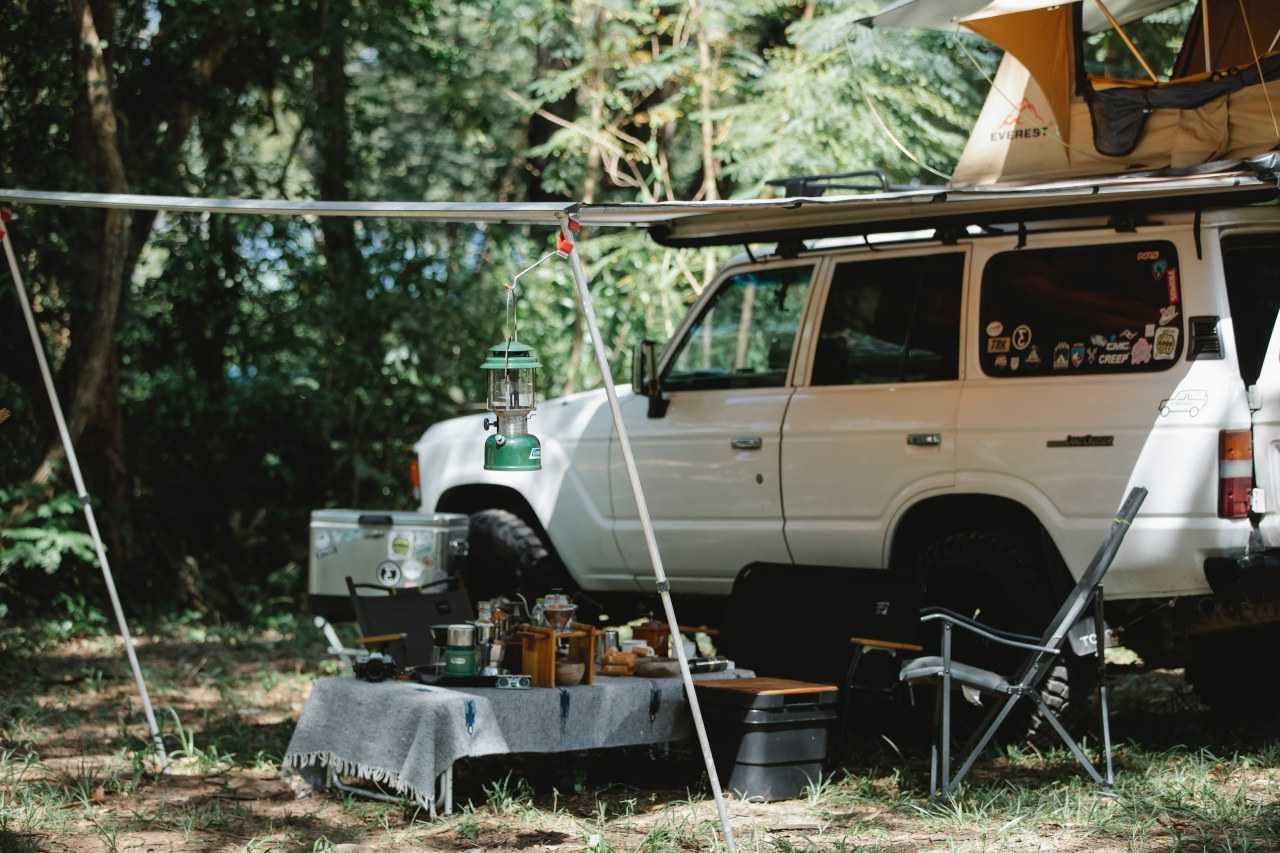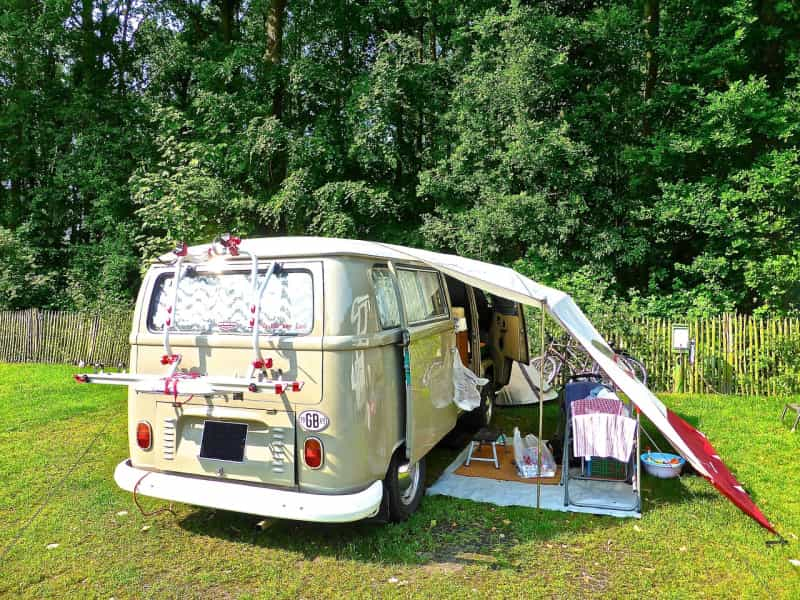Camping accessories buying guide
Whether you’re camping, glamping, caravanning or touring, camping accessories can really contribute to a spectacular time away from home. While some pieces of camping equipment are essential to almost all trips, such as beds or sleeping bags, camping accessories are the types of kit that are often handy to have around, whether it’s the added luxury of barbecue gear and extra outdoor space or awnings and canopies to protect yourself from the rain and sun.
That’s why we’re covering how to choose camping accessories and rounding up exactly what’s out there for different types of camping, including camping in a tent, staying in a tourer, motorhome or static caravan and for all trips, including glamping.

How to choose camping accessories
1. Consider your campsite’s rules.
The rules are always different for every campsite, and even the different pitch types at each location. So, always follow any campsite-specific rules such as only using barbecues if allowed.
2. Be mindful of your neighbours.
While setting up a porch extension or awning might maximise your space, try not to block a neighbour’s view or cross over their pitch boundary – two unspoken rules of camping.
3. Mind the weather.
Check the weather forecast before you complete your camping checklist, because some of the accessories you pack will depend on the weather. For example, a picnic set won’t be much use when you’re camping in bad weather, but a shelter will.
4. Keep your luggage space in mind.
Camping accessories can be bulky, so getting an accurate measure of your space, as well as the room you’ll have in your backpack or car boot, will narrow down your options.
5. Consider how you’ll be travelling to the campsite.
Will you be travelling in a car or hiking between campsites? Is there a long walk to your pitch? Will everything be loaded into your motorhome to save extra transportation? The weight of camping accessories can quickly add up, so keep these factors in mind.
Different types of camping accessories
Some types of camping equipment require a guide of their own, such as the different types of camping stoves, camping chairs and camping lights. However, these camping accessories can come in handy for several types of camping such as tent camping, caravans, motorhomes or glamping trips.
Tent accessories
Porch extensions
A porch extension or canopy is a piece of tarp that attaches to your tent to give your group additional sheltered space outside of your tent. They’re a great way to maximise your storage space, create a place to keep dirty shoes or camping clothes, or dine outside without the worry of rain getting in the way.
The size of extensions will vary: some may offer a small shelter from the rain right above your door, while others can create a whole new room for you to relax in.
Carpets
A tent carpet is a rug that campers can roll over their tent’s groundsheet. The main perk of using a tent carpet is that the extra cushioning can help you on your way to getting a good night’s sleep in a tent and insulate your tent at the same time – another key point for comfort. They’re especially useful on hard ground, which can hurt your feet, knees or back at night.
Windbreaks
When you’re camping in high winds, windbreaks can shelter your tent from some of the breeze. They also double up as a privacy screen, giving your pitch some privacy from passers-by or people on neighbouring pitches, and a sun screen to block out the rays and help to keep your tent cool in hot weather.
Storage
Different types of tent storage include lightweight camping cupboards, buggies with wheels, foldable organisers and rolling boxes. Cupboards, buggies and organisers with a foldable design and lightweight mesh material are particularly helpful, because they will be lighter and take up less space – and they can easily be tucked out of the way or into a car boot for transport. Rolling boxes are usually made from plastic and require more space in your tent and luggage.
Handily, some storage options also come with a hard top that can double up as a table, saving you extra space in your luggage.
Tourers, motorhomes and static caravans accessories
Awnings
As well as lending you additional outdoor space for alfresco meals, board games or whatever else you enjoy on your holidays, an awning can also protect your group from the sun or drizzle. If you’re expecting rainy conditions, check that the fabric of your awning is waterproof – vinyl awnings are best at keeping off water.

If you’re looking to add extra privacy to your pitch and create a living-room-like space, look for awnings that have sealable doors and groundsheets to keep your feet protected. Other awnings are designed as overhead canopies to protect you from the elements only; just make sure that you check the dimensions, so you choose one that adequately covers your group size.
Most awnings require a couple of people to set them up, so if you’re travelling on your own, an inflatable awning will be simpler to construct.
Towing jackets for tourers
A towing jacket's sole role is to protect your precious tourer from harm during transit. It will be strapped onto the front of your caravan to protect it from things like dirt, stones and other debris on the roads. They should have easy-to-undo zips that can be folded by one person if you’re going to be assembling the jacket on your own.
Wastewater container
A wastewater container is essential if your pitch isn’t fully serviced with a wastewater disposal point. Also called greywater containers, wastewater containers collect waste water from the wastewater hose on your caravan so that you can empty the tank regularly into your campsite’s designated fixed wastewater disposal point. Generally, a good wastewater container will have 35 litres to 50 litres capacity; the more litres it can hold, the less you’ll need to empty the tank.
Fresh water container
On the other side of things, you’ll also need a separate water container for clean, fresh water. We’d recommend finding a rollable container, which will be easier to transport to and from your campsite’s freshwater supply. A 10-litre container should be the very minimum capacity but we’d recommend over 30 litres, especially if you will be using it to take showers.
Steps
Unless you’re fine with taking a big leap or a drop when you’re entering and leaving your caravan or motorhome, you’ll likely need portable steps. Plastic steps are likely to break under pressure, so a steel caravan step is a heavier-duty option for steps that will be getting a lot of use. A handrail can also add extra stability for children or any users with accessibility needs.
Awning mats
Awning mats can be pegged down during bad weather such as rain to give your feet extra protection from wet ground. This could be in the form of an awning carpet, which will also add cushioning to the ground in dry weather.
However, if you’re going to be camping in bad weather, we’d recommend the waterproof option of an awning groundsheet. Floor tiles are also worth considering: they are especially breathable and easy to dismantle, but will do little to keep out moisture due to the gaps in the tiles.
Fire extinguishers
Prepare yourself for emergencies by packing a fire extinguisher. The best type of fire extinguisher for motorhomes or caravans is a water mist extinguisher, which is compact and safe to deploy in cramped spaces and still very effective at tackling fires. Dry powder fire extinguishers, which most people will be familiar with, aren’t advisable for such small spaces.
Covers
If your motorhome or caravan will be going into storage for the winter or any long period of times, a breathable cover will keep it in good working order by preventing condensation in cold or damp weather. Your cover should be water resistant to keep damp out and protect it from water damage.
Portable toilets
If your caravan or motorhome doesn’t have toilet facilities or you want to have a back-up in case of a plumbing emergency while you’re away, you’ll want to invest in a portable toilet. For a plumbing-free option, look for a toilet with a waste holding tank that can be emptied at a disposal point and a flush that is powered by a pump.
Accessories for all trips, including glamping
Barbecues
If your pitch permits barbecues, there are a few different grill choices. Instant barbecues are the most affordable, lightweight option for a one-time occasion, as the charcoal is already provided. Otherwise, longer-lasting barbecue options include charcoal barbecues, which can be slightly messy and require you to pack charcoal, or gas-fired barbecues, which require gas canisters for power. All barbecues should be compact, lightweight and have a stand so that they are elevated from the ground for safety reasons.
Cool boxes
One way to keep your food and drinks cool is with a cool box. They can be quite bulky and heavy, so check out the product dimensions and weight to see whether you can fit it into your luggage, car boot or holiday home first. The easiest option is a passive cool box, which doesn’t require any power due to foam insulation and stays effective for one to two days once ice packs are added. Those with access to electric hook-up can use electric cool boxes for a long-lasting cool box with lower temperatures.
Picnic sets
Whenever you want to put together a splendid spread outside of your tent or caravan, a picnic set will come in handy. Look out for a large, waterproof picnic blanket that will protect your group from moisture on the ground, with four rings that can be pegged down in breezy conditions. A set that includes plenty of sealable plastic tupperware of different shapes and sizes will also come in handy to keep your food fresh.
With the right accessories and equipment, such as high-quality camping beds, sleeping bags and clothes for camping, your camping break will be off to a flying start.
Browse our camping equipment guide
FAQ
How can I make my tent better for camping?
Ways to improve your tent include accessories such as porch extensions, carpets, windbreaks and storage.
How should I choose camping accessories?
Bearing in mind your campsite or pitch’s rules, you should be mindful of your pitch boundaries, check the weather forecast and keep in mind the space and weight of the accessories for travelling and storing equipment.